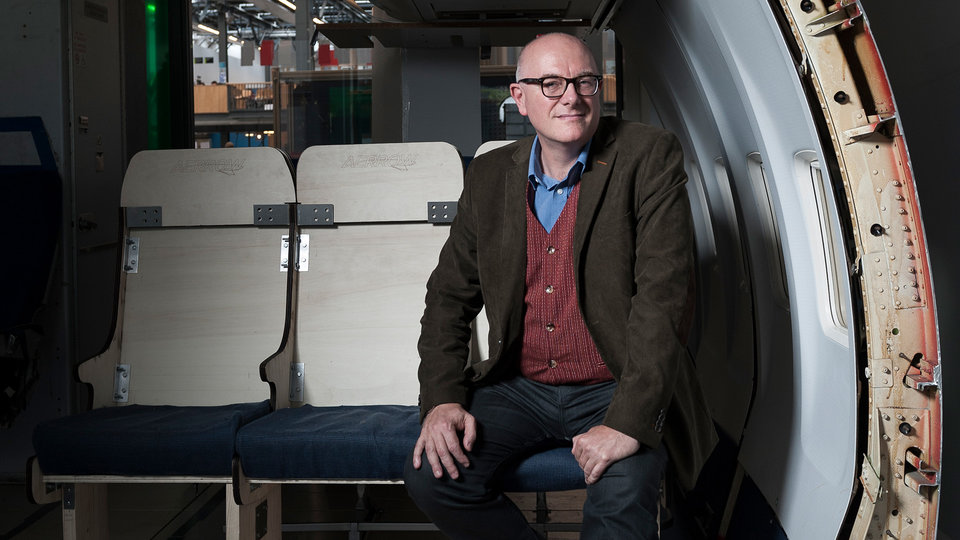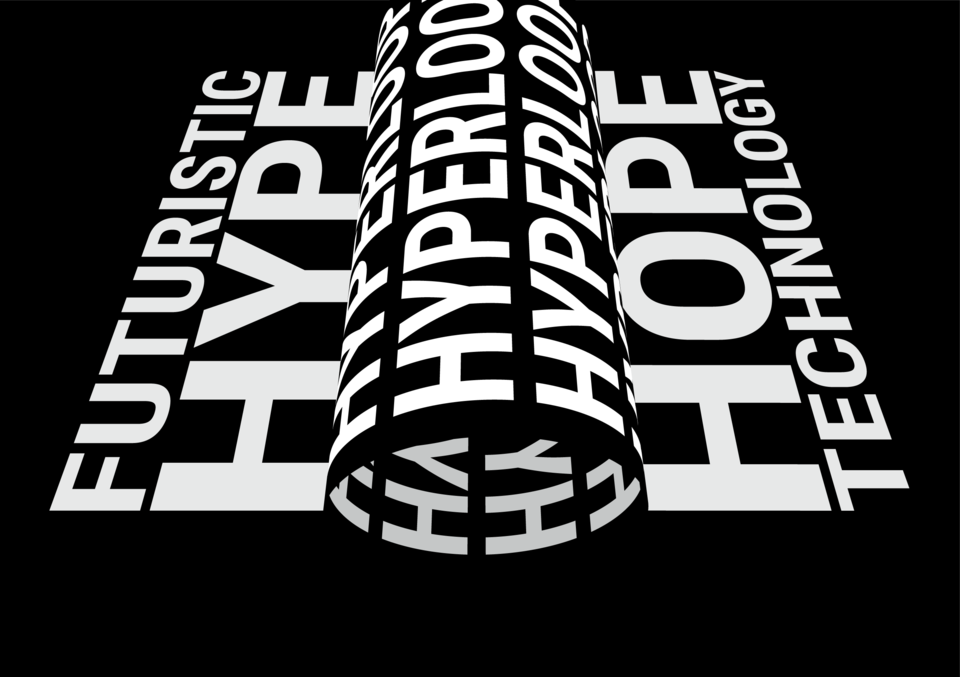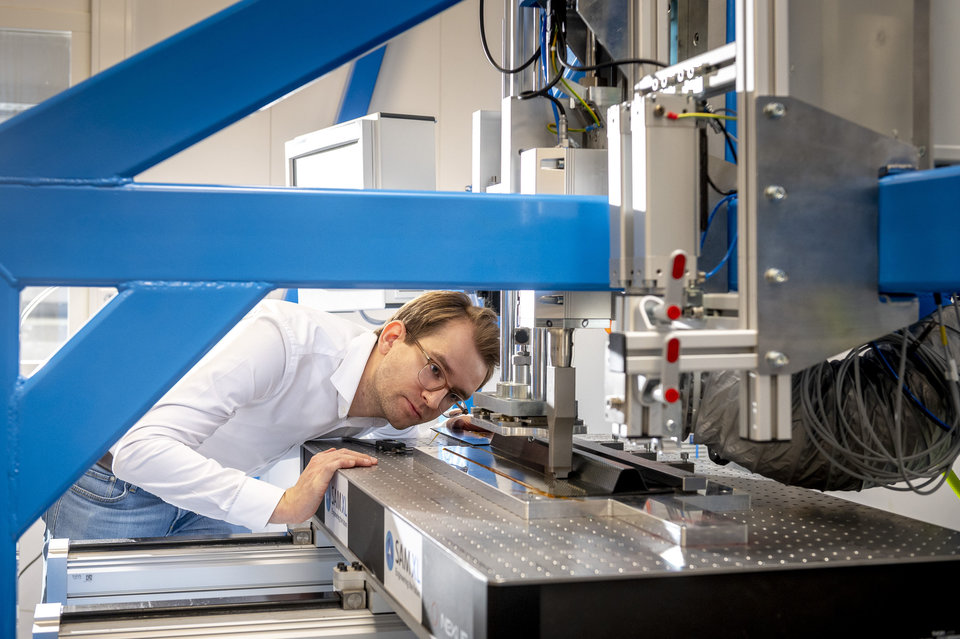Quantum certainty: delivering on the QuTech promise
QuTech will reach a remarkable milestone this autumn. ‘We’ll reach the point where the QuTech workforce will be overtaken by the number of people working in quantum startups in Delft’, says Lieven Vandersypen, scientific director of the cooperation between Delft University of Technology and the Netherlands Organisation for Applied Scientific Research (TNO). In other words, the children will outgrow the parent. ‘We’re currently at 300 coworkers and this number will continue to grow’, says Vandersypen, ‘but our startups are growing even faster.’
By Bruno van Wayenburg • October 25, 2023
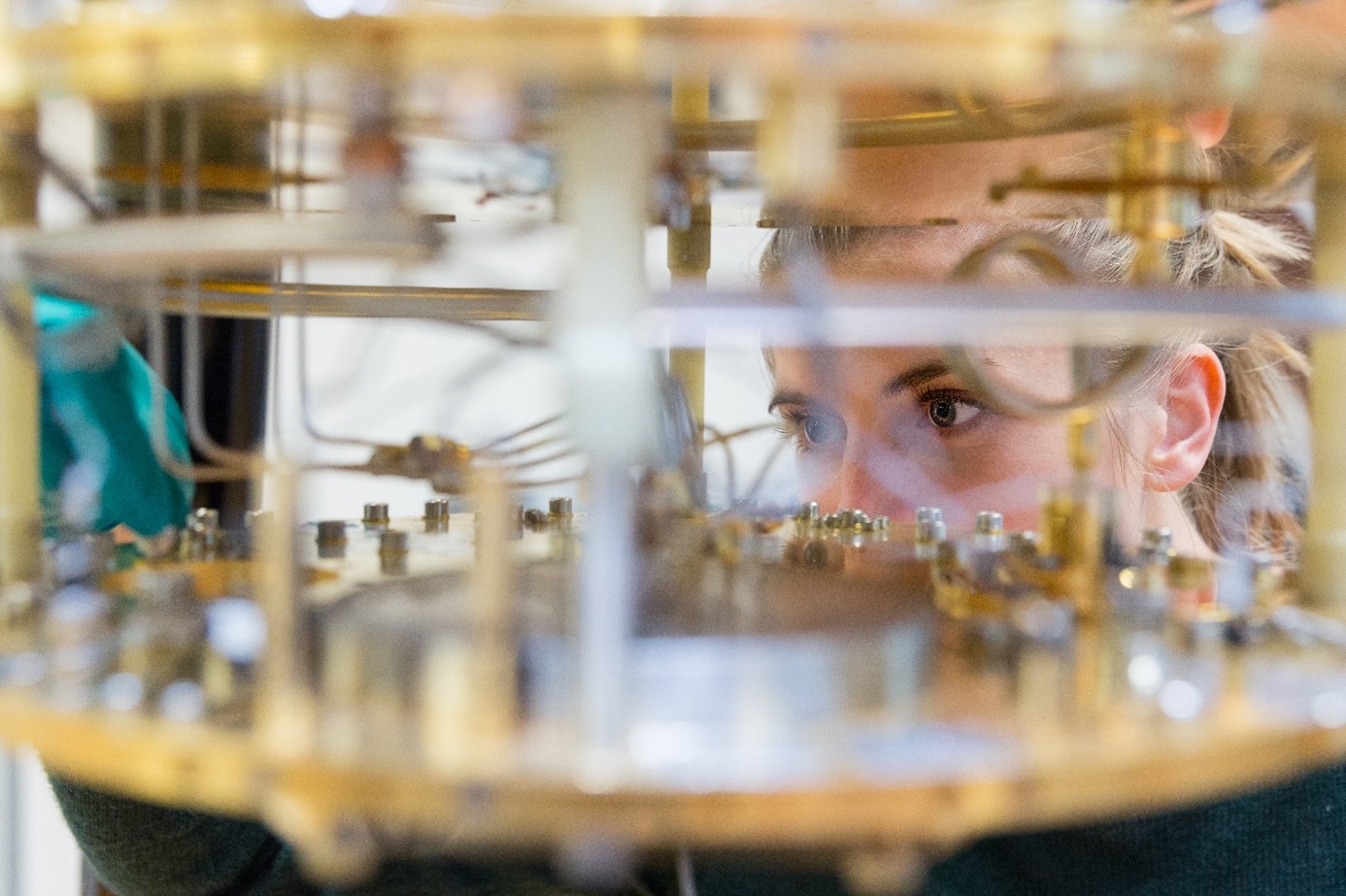
© Anne Reitsma
It all started as a rather theoretical concept: use some of the more intricate properties of quantum mechanics, the physics of the ultrasmall, to perform certain calculations. You could also transfer information in a fundamentally unbreakable way. Where our every-day computers use bits - units of information that can be 1 or 0 - quantum computing uses quantum bits (‘qubits’), which can be any combination of 1 and 0. Such a qubit could consist of a single elementary particle with the ability to exist in multiple states at the same time. In quantum mechanics, this ability is called a superposition.
Inspired by this possibility, physicists started finding several qubit candidates: physical systems that can preserve and manipulate such a quantum mechanical state, which is typically extremely fragile (see fold-out The undecided qubit race below).
-
It’s one of the more baffling and counterintuitive consequences of quantum mechanics: particles such as electrons and photons can exist in several states at once, called a superposition. This property is essential for quantum technology but it’s also very fragile: even tiny perturbations from outside can destroy (or decohere) the superposition.
To provide the best possible protection, physicists developed several qubit candidates. These are physical systems that allow superpositions to survive for longer periods (typically fractions of seconds), while also offering ways to control them and couple them to other qubits, another prerequisite for quantum technology. All of these candidates only work at very low temperatures of around -273 degrees Celsius.-
semiconductor qubits, also known as spin qubits, use a single electron trapped in a quantum dot, a nanometre-scale island of semiconducting material embedded in an isolating material. Cooled to -273 degrees Celsius, the quantum dot can hold an electron, which is the carrier of the superposition. The semiconductor design, well-known from ordinary computer chips, is useful for miniaturising and mass production.
-
nitrogen vacancy center A diamond crystal is made up of carbon atoms, but in some places, a nitrogen atom sits in the crystal lattice instead. This nitrogen atom can hold an extra electron, which can carry the superposition, relatively free from outside perturbations. The NV center can be read out and manipulated using laser light.
-
superconducting qubits This qubit, also known as transmon, is made of superconducting material, a material that conducts electricity without any resistance at low temperatures of around -273 degrees Celsius. Two patches of superconducting material, embedded within an isolator, together hold a tiny charge which encodes the qubit.
There are many other candidates, often carrying intriguing names, from trapped ions to Majorana quasiparticles, Kitaev chains and fluxonium. It’s not clear yet which of these will make it into practical quantum technology applications.
-

Kees Eijkel, Director of Business Development at QuTech © QuTech

Lieven Vandersypen, Director Research at QuTech © QuTech
The quantum revolution
After theoretical physicists and mathematicians explored these concepts in the early 2000s, a quantum revolution became imminent. Enticed by applications that no other technology promises, large universities and companies such as IBM, Google, Intel, Microsoft and Fujitsu started working on quantum computers. Two applications loom large in the future of quantum technology. One is the famed quantum computer, which can perform certain specific calculations immeasurably faster than any normal computer could ever hope to achieve.
‘For example, take calculations relating to the structure of molecules and materials’, says Vandersypen. ‘Their behaviour is determined by the behaviour of atoms and electrons, which is inherently quantum mechanics. Imagine designing batteries that are so powerful you only have to charge your phone once a week or making electric cars with enough range to drive from the Netherlands to the south of France on one charge. Or think about more efficient chemical plants, developing drugs to treat incurable diseases, and optimised fertilisers that help to feed us but have less impact on the environment.’
To predict how this future will become a reality, is notoriously difficult, he admits, ‘This is the one application that would have very broad use, but I expect it to be around ten years away at least.’
QuTech
Another important quantum technology is quantum communication, a form of secure communication that is fundamentally impossible to eavesdrop on. Vandersypen: ‘The quantum nature of the connections and nodes will make any interception inherently detectable.’
As research at TU Delft delivered more quantum breakthroughs, QuTech was launched in 2015 with a vision to make the Netherlands a hub for quantum technology. ‘Quantum computing comprises about two-thirds of QuTech research, quantum internet about one-third’, says Vandersypen.
‘QuTech is unique in its broad, horizontal research strategy’, says Kees Eijkel, QuTech’s director of Business Development. ’We don’t know which qubit candidate will turn out to be the most useful for building quantum technology, and there may even be several. Where many parties choose a vertical approach, e.g. one type of qubit, one type of computer, we’re saying that there are several options at every level. We keep working on the options that we believe are still in the race to win.’
‘Apart from the type of qubit, there is a lot of focus on the number of qubits’, says Lieven Vandersypen. News headlines tout claims of quantum computers comprising ever higher numbers of qubits, with IBM announcing a 433 qubit computer last May. ‘But many other factors come into play’, says Vandersypen. ‘For example, how well you’re able to control your qubits - i.e. the fidelity - is important.’ The quantum information encoded in qubits is inherently fragile. They need to be protected and made to interact with other qubits in precise ways to build quantum applications.
A third factor is connectivity: the number of links each qubit can make. Vandersypen: ‘In an ideal world, each qubit could talk to every other qubit. In practice, the qubits can often only talk to their direct neighbours.

‘Imagine designing batteries that are so powerful you only have to charge your phone once a week’

The inside view of a dilution refrigirator ('fridge'), used to cool sensitive qubits to their working temperature near absolute zero (-273 degrees Celsius). © Marieke de Lorijn
Another look at the inside of a dilution refrigirator © Klapstuk
Unique Delft approach
While QuTech scientists are working hard to increase these numbers, they concern only the core of any quantum system, which requires many other parts: from ultra-precise electronics to exert control and read out qubits to cabling that can transmit quantum information. And from reliable photon detectors to refrigerator systems that deliver the required temperatures of just above the absolute minimum of -273 degrees Celsius.
QuTech’s approach to this is also unique. ‘QuTech is very focused on developing the full system, the full stack as we say’, says Vandersypen. Where players like IBM and Google choose to develop this full stack in-house, QuTech focuses on fostering an ecosystem of research groups and companies developing individual parts.
For example, the quantum startup Q*bird is working on quantum key distribution, a vital ingredient of secure quantum networks. Another startup, Quantware, builds quantum chips, while Orange Quantum Systems develops software to calibrate quantum systems, and the startup Qphox is working on interconnects, which can transfer quantum information optically. There is a university spin-out, Single Quantum, developing superconducting nanowire devices that can reliably detect single photons or light particles.
House of Quantum
Many startups are housed in the House of Quantum incubator centre in Delft. ‘There is a lot of collaboration and discussion, and we do collaborate on development projects to match each other’s technology’, says Niels Bultink, CEO of Qblox, a scale-up company that develops, builds and sells control electronics.
‘As a PhD student in Delft, I did experiments on error correction, a way to combine several qubits to make a single, more reliable qubit. To do this, I needed special equipment that was being developed by TNO’, says Bultink. Halfway through the PhD project, we realised: ’We can make a company out of this.’
Five years ago, the control electronics of the quantum chips were quite complicated: ‘We used a lot of standard lab equipment such as wave generators and oscilloscopes, and we built the control system piecewise. That’s how university research works. But scaling-up things is an expensive and slow way to work, which is prone to errors.’
So Qblox designed and built dedicated, scalable electronics that combine all functions with one miniaturised, modular system that can control 20 qubits with picosecond precision. This makes things much more scalable and ready for larger quantum chips. ‘We now have 85 people working here’, says Bultink, ‘and more than 100 systems ordered. We have even been able to turn a profit in our first years. I suppose we are no longer a start-up but a scale-up.’
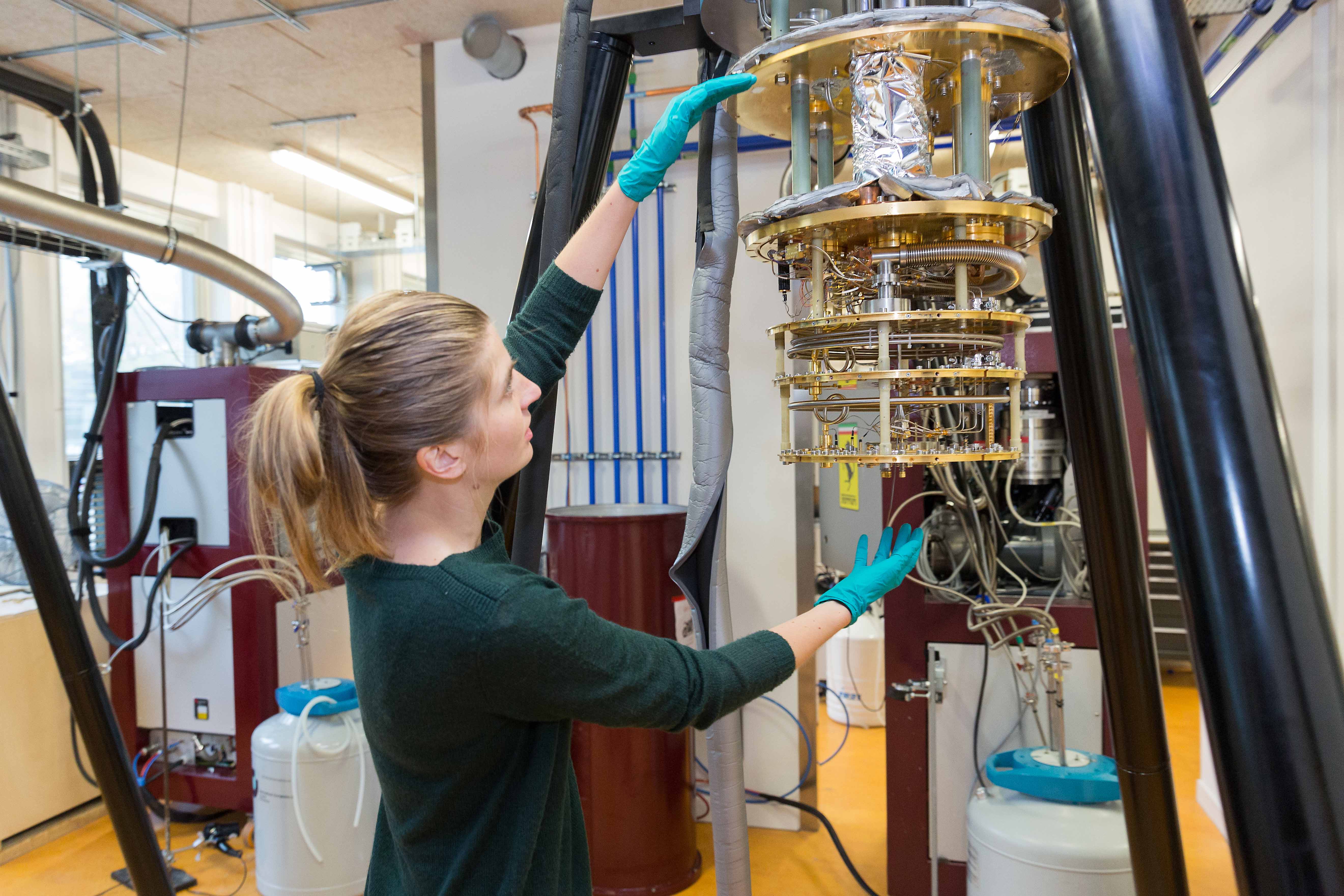
A QuTech PhD student working in the quantum computing lab.
© Anne Reitsma

Gold plated copper plates are used to conduct heat in subsequently colder stages of the fridge, with the coldest lower stage housing the quantum devices. © Pim Top
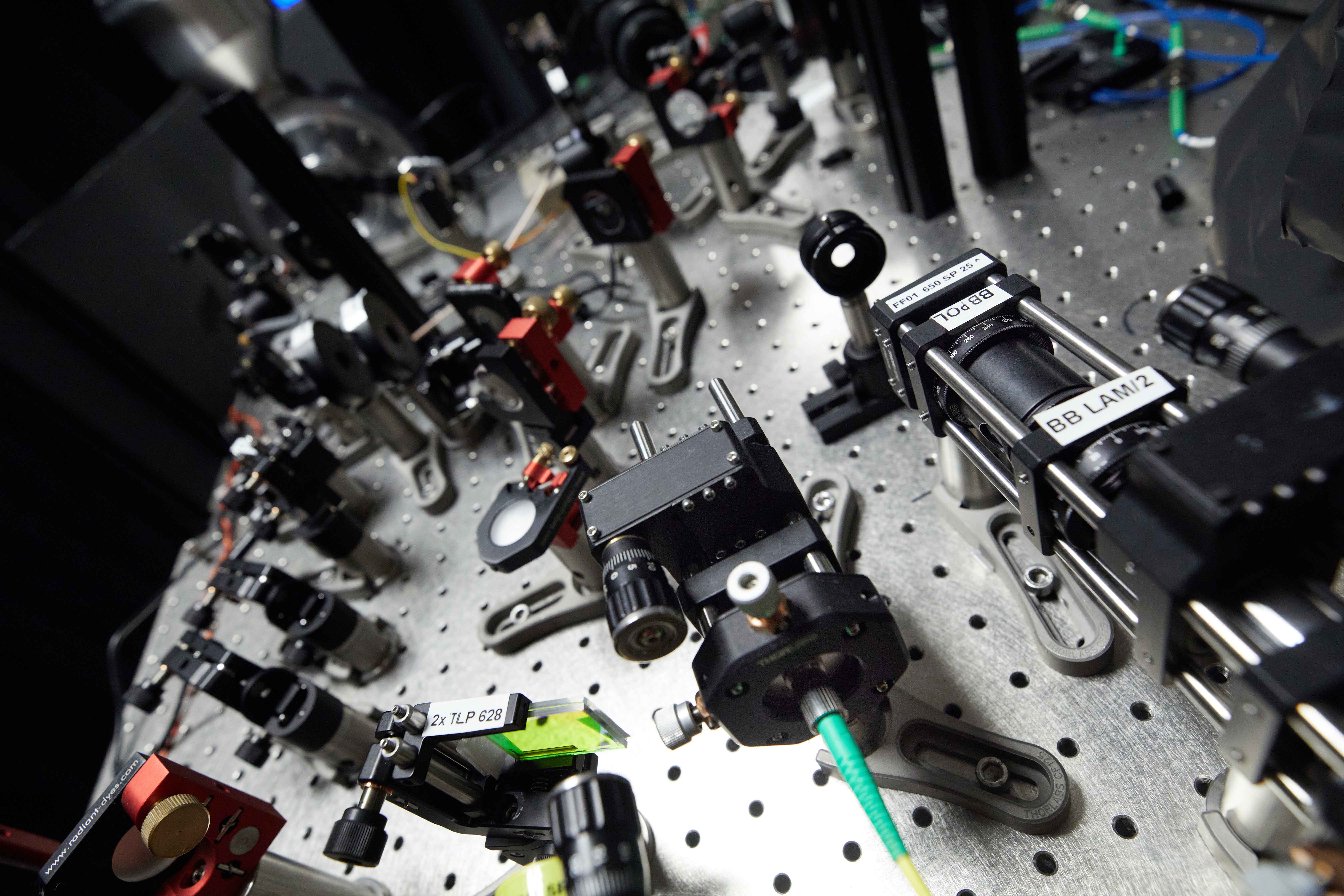
Quantum properties of light can be created and manipulated using laser sources, lenses and other devices on an optical table. © Cheeseworks

Researcher Ivan Kulesh mounting a quantum chip, to be cooled to 0,3 degrees above absolute zero. © Cheeseworks
Fujitsu
QuTech also cooperates with major companies like Intel, Microsoft and recently the Japanese company Fujitsu (see fold-out below). ‘Collaborations like these are extremely important. QuTech is about building options for a scalable quantum system’, says Kees Eijkel. ‘A working experiment in a lab, created by university researchers, is only the first step. Ultimately, you will have to make ten, a hundred, a thousand of them, in a reliable and, ultimately, cost-efficient manner.’
QuTech deploys demonstrator projects to bridge fundamental research and commercial activity in companies. These projects are full stack functional systems to showcase Quantum Technology. One such demonstrator is Quantum Inspire, an online interface that anyone can use to test a real 5-qubit quantum system functioning in Delft. Another demonstration project is the star-shaped quantum internet that Q*bird has set up in the Rotterdam harbour to showcase inherently safe quantum communication.
-
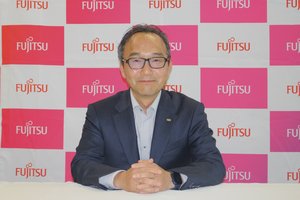
Shintaro Sato, Head of Quantum Laboratory at Fujitsu
With more than 120,000 employees and a net profit in excess of a billion euros, Fujitsu is one of the world’s largest IT service providers. ‘We've been working on computer technology since the era of the mainframe in the 1970s’, says Shintaro Sato, head of Fujitsu’s Quantum Laboratory, which has entered into a partnership with QuTech in the field of quantum computers.
The company is a supplier of High Performance Computing (HPC) systems. ‘But Moore’s Law, which ensured years of successful, steady increase in computing power, is plateauing’, says Sato, ‘and we are looking at alternatives.’
These include special chips for specific computing tasks, such as Artificial Intelligence, along with Digital Annealers and Ising Machines. These are computers based on quantum mechanics principles that specialise in solving combinatorial optimisation problems, such as the optimisation of Toyota’s production processes.
Fujitsu is working on fully-fledged quantum computers in collaboration with the Japanese research institute RIKEN, with super-conducting qubits being their qubit technology objective.
The collaboration with QuTech involves the NV Center qubits based on nitrogen atoms in a diamond lattice, which is a specialism of TU Delft. ‘We want to develop a scalable system based on standard tiles of 64 qubits. These can then be combined to achieve larger numbers’, says Sato. In this way, the Japanese specialism of integrating and upscaling electronics augments TU Delft’s existing knowledge.
One advantage of the NV Center qubits is that the working temperature is higher than 1 Kelvin (one degree higher than absolute zero, or -273 degrees Celsius). These ‘hot’ qubits require less intense cooling measures than other types that work at lower temperatures.
Fujitsu and QuTech will also collaborate on the software, i.e. the protocols for controlling the qubits. And ultimately on the development of applications, says Sato. ‘We have some ten companies in various branches of industry, from manufacturers of computer chips to Fujifilm, who are interested and already working on applications.’ Sato expects useful applications of the first quantum computers to become available by the end of this decade.
‘Ultimately, we want to fit this quantum technology into the computing-as-a-service platform that we have just launched’, he says. This is an accessible yet powerful computing platform that frees clients from worrying about the exact computing technology. ‘This currently consists of our High Performance Computer, the Digital Annealer, and a quantum computer simulator. The actual quantum technology will simply be added to this.’
Facilitating collaboration
Connecting research and applications is integral to QuTech. ‘The natural tendency for scientists is to focus on their research, while companies tend to focus on selling to their clients. We are the hub that facilitates cooperation between the parties’, says Kees Eijkel, ‘not on a project basis but permanently.’
To do this, QuTech fosters continuous dialogue between all the contributors. ‘It’s a continuous back and forth’, says Eijkel. ‘Companies can ask the scientists to investigate certain questions, while scientists inform the companies about useful technologies they are working on.’
‘This has been proven to work for almost a decade, bringing quantum technology ever closer to real-world applications, but the trick is to persevere’, says Eijkel. ‘Don’t just say, “Okay, that’s rolling along fine, let’s move on to the next subject”. That would lead to the withering of the plant that you have been so painstakingly nurturing and growing.’
Eijkel stresses that this doesn’t only or even mainly concern funding, but other forms of involvement as well. Researchers and developers working on startups are welcome to set up shop in Delft, while policymakers could consider what quantum will mean for society in the long run. Government parties might turn out to be launching customers or considering it in new regulations. Even if they don’t, the knowledge and involvement of policymakers will lead to better policy decisions.
Helping society
This involvement, says Vandersypen, goes both ways. ‘We don’t do this for ourselves. Science is meant to help society with applications, but we also feel the duty to inform society about those applications. Quantum technology is a new technology, and new technologies always have unexpected consequences, some good and some potentially dangerous. This is where we want to assume responsibility and be part of the discussion.’
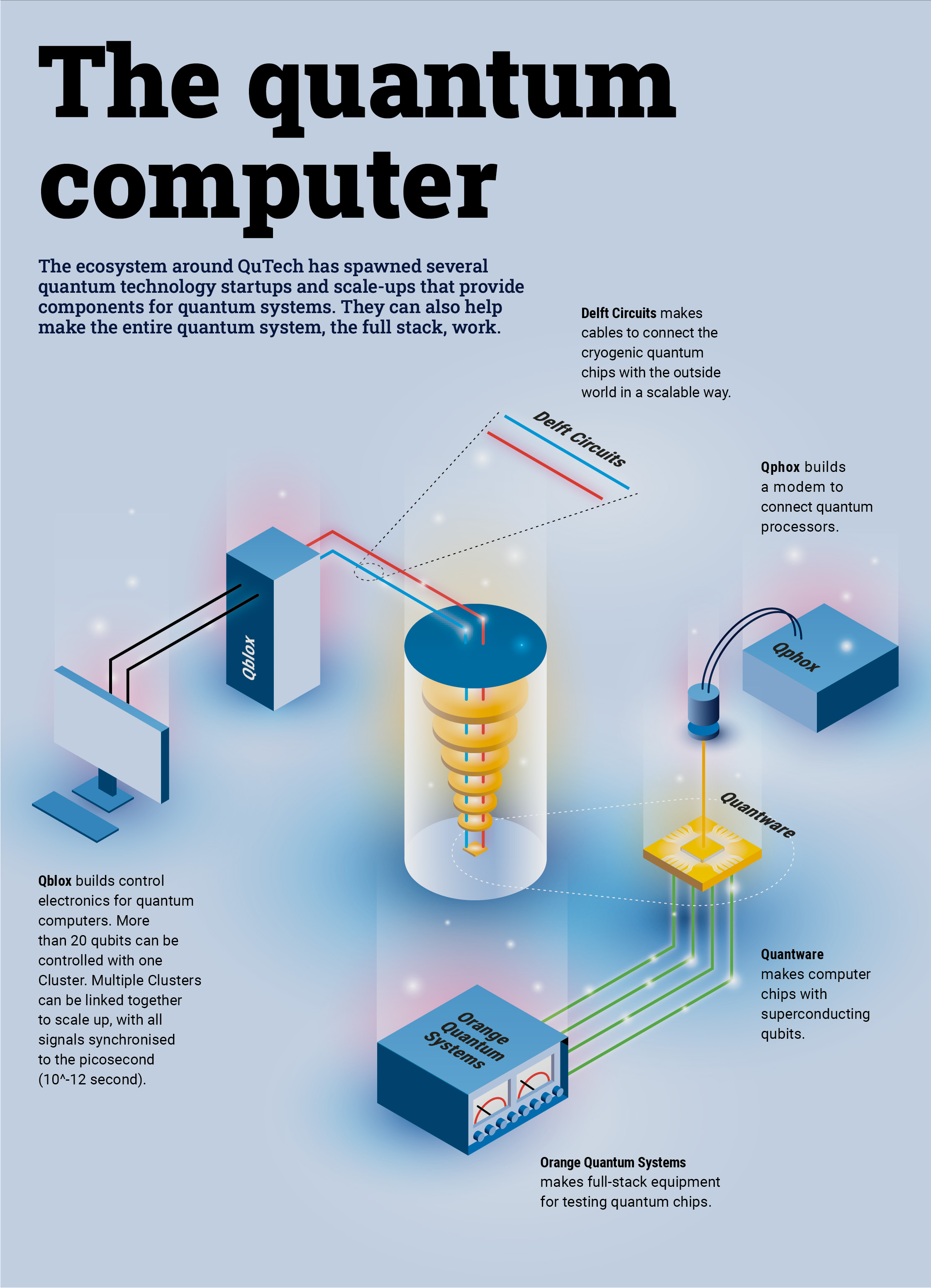

![[Translate to English:] [Translate to English:]](https://filelist.tudelft.nl/_processed_/e/0/csm_Cofounders-Meatable_Dumplings-full-res_bewerkt_resize_8300dcb64f.jpg)


